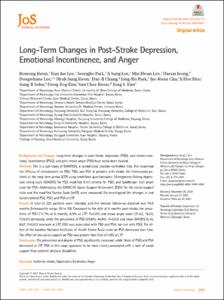Long-Term Changes in Post-Stroke Depression, Emotional Incontinence, and Anger
- Keimyung Author(s)
- Sohn, Sung Il
- Department
- Dept. of Neurology (신경과학)
- Journal Title
- 대한뇌졸중학회지
- Issued Date
- 2021
- Volume
- 23
- Issue
- 2
- Keyword
- Ischemic stroke; Depression; Emotions; Anger
- Abstract
- Background and Purpose:
Long-term changes in post-stroke depression (PSD), post-stroke emotional incontinence (PSEI), and post-stroke anger (PSA) have rarely been studied.
Methods:
This is a sub-study of EMOTION, a randomized, placebo-controlled trial, that examined the efficacy of escitalopram on PSD, PSEI, and PSA in patients with stroke. We interviewed patients at the long-term period (LTP) using predefined questionnaires: Montgomery-Åsberg depression rating scale (MADRS) for PSD, modified Kim's criteria for PSEI, and Spielberger trait anger scale for PSA. Additionally, the ENRICHD Social Support Instrument (ESSI) for the social support state and the modified Rankin Scale (mRS) were measured. We investigated the changes in and factors behind PSD, PSEI, and PSA at LTP.
Results:
A total of 222 patients were included, and the median follow-up duration was 59.5 months (interquartile range, 50 to 70). Compared to the data at 6 months post-stroke, the prevalence of PSEI (11.7% at 6 months, 6.3% at LTP; P=0.05) and mean anger score (21.62, 16.24; P<0.01) decreased, while the prevalence of PSD (35.6%, 44.6%; P=0.03) and mean MADRS (6.16, 8.67; P<0.01) increased at LTP. ESSI was associated with PSD and PSA, but not with PSEI. The effect of the baseline National Institutes of Health Stroke Scale score on PSD decreased over time. The effect of low social support on PSD was greater than that of mRS at LTP.
Conclusions:
The prevalence and degree of PSD significantly increased, while those of PSEI and PSA decreased at LTP. PSD in this stage appeared to be more closely associated with a lack of social support than patients' physical disabilities.
- Keimyung Author(s)(Kor)
- 손성일
- Publisher
- School of Medicine (의과대학)
- Citation
- Boseong Kwon et al. (2021). Long-Term Changes in Post-Stroke Depression, Emotional Incontinence, and Anger. 대한뇌졸중학회지, 23(2), 263–272. doi: 10.5853/jos.2020.04637
- Type
- Article
- ISSN
- 2287--6405
- Source
- https://www.j-stroke.org/journal/view.php?doi=10.5853/jos.2020.04637
- Appears in Collections:
- 1. School of Medicine (의과대학) > Dept. of Neurology (신경과학)
- 파일 목록
-
-
Download
 oak-2021-0069.pdf
기타 데이터 / 423.21 kB / Adobe PDF
oak-2021-0069.pdf
기타 데이터 / 423.21 kB / Adobe PDF
-
Items in Repository are protected by copyright, with all rights reserved, unless otherwise indicated.